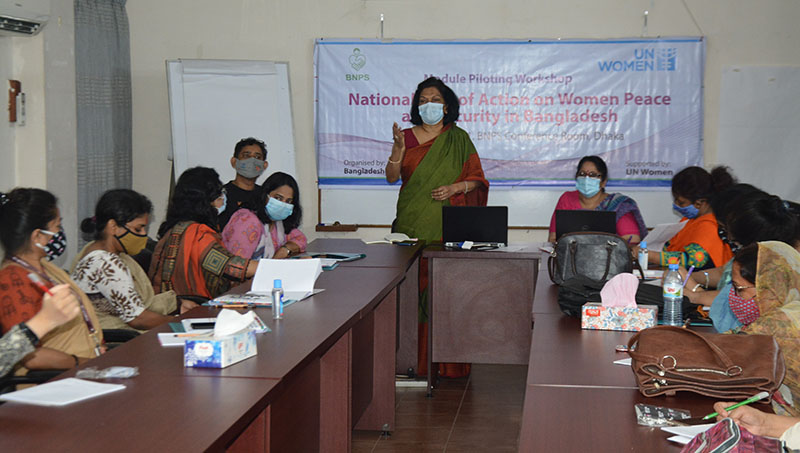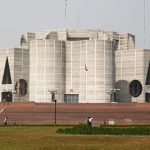
Bangladesh Nari Progati Sangha (BNPS) just has accomplished a short-term project titled ‘Creating Space for Accelerating Peace and Security’ amidst the corona pandemic during January-March 2021.
In the year of 2017 and 2018, BNPS had opportunity to work on UNSCR 1325 and WPS framework issues under a project titled “Empowered Women Peaceful Community” supported by UN Women. During that time, BNPS produced number of communication and training materials, conducted various capacity building training and orientation among local and national level CSOs, organized districts, divisional and national level consultations including round table and TV talk show, formed women CSOs platform and brought grassroots input for feeding it into the development of the NAP WPS. All these created opportunity for BNPS to become a Knowledge Hub organization on that particular issues. Discontinued of the project in the early of 2019 had created gap to continue the momentum due to turn over of skilled and knowledgeable staff.
Though, this phase was only for three months, however, it helped BNPS to recall and to reuse available knowledge and experiences, minimized the gaps with improved knowledge and understanding with particular focus on the NAP WPS implementation and monitoring.
Bangladesh has launched its NAP WPS for 2019-2022 under the leadership of Ministry of Foreign Affairs (MOFA) with the support of UN Women which is the key tool to transform UN Security Council Resolution 1325 and other women, peace and security commitments into practical action.
Though the NAP WPS of Bangladesh adopted in November 2019, the degree of the implementation of it is not very much satisfactory due to corona outbreak and other reasons. So it was important to initiate a campaign to accelerate the implementation of it.
Under this project BNPS conducted a mapping to select women-led organizations and identify their capabilities across the country; Developed a three-day long training module on the capacity building of the CSOs and women-headed organizations to monitor the national and local-level activities developed on the basis of the NAP WPS; conducted three batches training on the implementation of NAP WPS; organized consultations at national and local levels; operated awareness campaign and organized dialogue among different stakeholders.
The primary beneficiary of the project was women-led CSOs in 16 districts and media personnel, civil society representatives, academics, researchers, NGOs, government officials, influential, development partners and policy makers were included as secondary stakeholders.
The project has empowered more than 35 women-led CSOs of 16 districts in Bangladesh including capital city Dhaka. Every CSO has their own set up on the ground including comparative advantage and leverage of opportunity as they have been working among the community with support of local administration and other government agencies since long. All these inspired them to scale up few interventions by their own initiatives. This may include orientation on NAP WPS among their staff and volunteer, share the info about NAP WPS in different forum meetings (GOs/NGOs) and create linkage with relevant government institutions as a part of promoting local level implementation.
Besides, this project helped making people aware on the issue of women, peace and security (WPS) and the national action plan of Bangladesh on WPS through different strategies, such as social media campaign through creating Facebook page, uploading web banners/posters, interview based documentary and video clips of zoom events; publishing newspaper supplement and bilingual publication on NAP; and organizing TV Talk Show.



